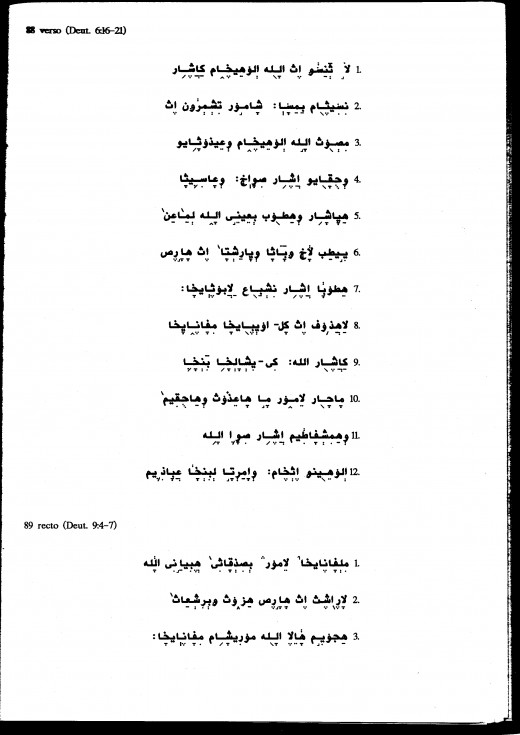Karaite Accusations
One of the more common accusations made against Karaites, especially by leaders of Rabbinic Judaism, is that the Karaite religion is closer to being a Muslim faith. It's an odd accusation especially to those of us that practice Karaism, making no sense at all since there is no adherance to the Qur'an and Mohammed is definitely not seen as a prophet. It got me wondering as to how this falsehood may have come about in the first place. Looking through some of my old books in my library and the bibliography of books written or edited by my third great-grandfather Jakob Goldenthal, the answer became quite clear. Books such as the writings of Gedaliah ibn Yahya which Jakob edited in 1847, or the translation into Hebrew of al-Ghazali's Mizan al-Amal (The Scales of Justice) that he did in 1839 both had an obvious common denominator; they were originally written in Arabic. I look at some of the Old Testament pages that I have in front of me written in Arabic (See the scann of a page from Deuteronomy) and I realise I can't read them at all, not a single word, yet my ancestor was fluent in both reading and writing the language. And his ancestors before him would have been equally skilled in the language. It became clear to me that this was the key difference that led to the accusation; the fact that Karaite Jews were equally comfortable praying and performing their religious duties in Arabic as well as Hebrew. The Rabbinate used that as their defining point, levelling the charge that Karaites were Islamophiles in religious practices which in reality is laughable because it has as much merit as accusing the Pope of being Jewish because he wears a skullcap. Nevertheless, the accusation appears to have stuck for many centuries and has been a point of division and derision between our two sects of Judaism.
A Page from Deuteronomy

Why Arabic?
The question isn't rhetorical. It's quite a deliberate inquiry that deserves investigation. Tradition would tell us that the language of the Patriarchs was Hebrew and by reason of deduction if they communicated with God, then God must have spoken Hebrew and therefore Hebrew was the Holy language. A case of if A=C and B=C then it must hold true that A=C. As such, the Torah had to be preserved in Hebrew if it was to remain a holy book. Much in the same way that the Roman Catholic Church insisted the Vulgate had to remain in Latin and when the Protestant movement arose insisting that it be read in the common language of the people, then the Catholic Church condemened all those that dared to read the Bible and hold services without the use of Latin. Just like the Rabbinate insisting that it was ordained orally that the Bible should be read in Hebrew, so too the Catholic Church had its own oral tradition proving that it was Latin that was the Holy language. But to a Karaite, who's entire fundamental belief is that what God wanted us to do he had completely written into the Torah, then the insistence on an oral tradition being the one and only way was a challenge that could not be avoided. And just like the Protestant movement, the Karaite movement rewrote the Five Books of Moses in the Arabic Language. This was not only a religious stance against Rabbinic Judaism but a political one as well. It was reserved for the Old Testament only, as Karaite scholars wrote almost all their commentaries and other material exclusively in Hebrew. This is not to say that certain Karaite communities did not carry on the writing of the Masoretic texts in Hebrew, but it was quite common to argue that the Masoretic texts produced by the Rabbinical Jews even had their written differences depending on whether it was produced by the Palestinian or Babylonian schools and therefore an Arabic version could be no more erroneous than these others and in many ways could be proven to be far less.
Accusing the Accusors
Once the use of a Masoretic text written in Arabic was established, it became easy to start pointing out the issues and contradicitons in the Hebrew bibles. This is exactly what Karaite scholars began doing. They would state that the Rabbis would read the Torah outloud in one way but write the words down in another. There was a conflict between the reading traditon and the written tradition which Karaites said the Rabbis used so they could add their own interpretations and often a passage would have two entirely different interpretations. Coincidentally, this same accusation exists within the Islamic religion where Shi'ites accuse Sunnis of doing the same thing. Karaites explained that the use of Arabic, with its sounding symbols meant that the way the text was read would also be the way it was written. The use of Classical Arabic meant the vowels were all represented which was not the case with Hebrew. Once the Karaite communities began levelling charges against the Rabbinical communities the rift between the two sects became impossible to heal.
It is fair to say that the primary motivation behind the Karaite choice to transcribe the Torah into Arabic was the hostility born against the Rabbinic culture. But in so doing, the forefathers of the Karaim succeeded in providing us with a distinct sectarian identity. Being different doesn't make us any less Jewish but as long as there are still those within the Rabbinic communities that accuse us of being a sect of Islam, they will never fully understand or appreciate the history of their own people.








